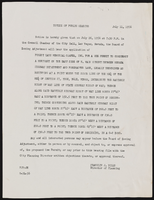Search the Special Collections and Archives Portal
Search Results
Byrd Wall Sawyer Collection
Identifier
Abstract
The Byrd Wall Sawyer Collection primarily consists of Byrd's research files on Nevada from 1930 to 1970. The materials concentrate on her monograph, "Nevada Nomads," as well as her co-authored textbook, "Here is Nevada." The collection also includes speeches, journal articles, memos, research note cards and papers, correspondence, informational booklets and pamphlets, maps, photographs, audiovisual materials, and newspaper articles and clippings.
Archival Collection
Richard B. Taylor Papers
Identifier
Abstract
The Richard B. Taylor Papers (1920-1993) document Richard Taylor's career and interests as a longtime Las Vegas, Nevada businessman and local historian, including his work as an executive at the Hacienda Hotel and Casino. The materials also include maps, development plans, and local publications for the Nevada communities of Laughlin and Mount Charleston, as well as publicity and promotional materials for these projects. As an amateur historian, Taylor also collected information on Las Vegas, Laughlin, and Mount Charleston.
Archival Collection
Maurine and Fred Wilson and Dr. William S. Park Photograph Albums
Identifier
Abstract
The Maurine and Fred Wilson and Dr. William S. Park Photograph Albums (1900-1930s) consist of twelve albums containing black-and-white photographic prints and three black-and-white photographic negatives. The photographs are primarily related to the families of William S. Park, John S. Park, and Fred and Maurine Hubbard Wilson. Included are images of the Park homes in Las Vegas, Nevada; Park and Wilson family members; scenes of early Las Vegas, Nevada; outdoor activities, and vacation trips to California, Colorado, and Mexico.
Archival Collection
Tomiyasu Family Photograph Collection
Identifier
Abstract
The Tomiyasu Family Photograph Collection (approximately 1908 to 1991) consists of black-and-white photographic prints of the Tomiyasu family and their farming business in southern Nevada.
Archival Collection

Transcript of interview with Dr. Catherine Bellver by Caryll Batt Dziedziak, November 13, 1995
Date
Archival Collection
Description
Dr. Catherine Bellver is a woman with tenacity. How else could one describe her drive to create the Women's Studies Program spanning fifteen years? As a faculty member in the Department of Foreign Languages, Dr. Bellver first joined the Women's Studies steering committee in 1979. In the following decade, the committee oversaw the formation of the Women's Studies Program, including: procuring administrative and faculty support, creating bylaws and course criteria, critiquing proposed cross-listed courses, and selecting course offerings. During that period she also worked with a volunteer group to create and staff the first Women's Center on campus. In the early Nineties, she played an instrumental role in the presentation of four public colloquia that addressed key issues pertaining to women. Dr. Bellver acted as interim director of the Women's Studies Program while overseeing the search for a permanent director. She continued to remain involved with the Women's Studies program, serving as faculty member on several committees. She has also worked in the Women's Caucus on the regional and national levels of the Modem Languages Association Dr. Bellver is currently Distinguished Professor of Spanish in the Department of Foreign Languages at the University of Nevada, Las Vegas. Her work has appeared in journals such as Anales de la Literature Espanola Contemporanea, Hispanic Review, Hispanofila, Insula, Journal of Interdisciplinary Studies, Monographic Review/Revista Monografica, Revista de Estudios Modernos, Revista Hispanica Moderna, Romance Notes and Romanic Review. Dr. Bellver's participation in the creation of the Women's Studies Program illustrates how critical institutional and social progress can result from the commitment of a determined group of individuals. Her decades of involvement in creating an academic arena for the study of women and gender issues underscores the significance of women's contributions to the history of Las Vegas. In addition to the history of the Women's Studies Program at the University of Nevada Las Vegas this interview contains information regarding the creation of the first Women's Center on campus.
Text

Meeting minutes for Consolidated Student Senate University of Nevada, Las Vegas, December 3, 2001
Date
Archival Collection
Description
Text

Eric Mendoza oral history interview: transcript
Date
Archival Collection
Description
Oral history interview with Eric Mendoza conducted by Holly O'Donnell on November 29, 2021 for Reflections: The Las Vegas Asian American and Pacific Islander Oral History Project. In this interview, Eric Mendoza shares his family's chain migration history from Manila, Philippines to the United States and his difficult immigration and naturalization process once arriving in America in 1996. He talks about what brought him to live in Las Vegas, Nevada, his education and professional pursuits, what his life is like in the United States compared to that of the Philippines, and the lives of his eight siblings. Eric Mendoza discusses the historical past of the Philippines, the infrastructure in place there, and government corruption. He also speaks to Filipino traditions and festivals, food and customs, his cultural identity, and assimilating to American culture.
Text

City of Las Vegas building codes, notices, correspondence
Date
Archival Collection
Description
City of Las Vegas building codes, notices, correspondence
Text

Transcript of interview with Mary Kreuzer by Patricia Kohlman, December 15, 1975
Date
Archival Collection
Description
On December 15, 1975, Patricia Kohlman interviewed Mary Kreuzer (born 1923 in Las Vegas, Nevada) in her home in Las Vegas. The two discuss Kreuzer’s childhood, as well as the different addresses that she’s lived at in Las Vegas. The interview concludes with a discussion on entertainment and small businesses before the population boom in Southern Nevada.
Text
